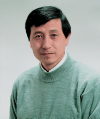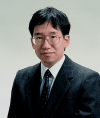


Next: Language Processing Systems Laboratory
Up: Department of Computer
Previous: Mathematical Foundation of ...
 / Qian Ping Gu / Professor
/ Qian Ping Gu / Professor
 / Sergei Duzhin / Visiting Professor
/ Sergei Duzhin / Visiting Professor
 / Zoltan Esik / Visiting Professor
/ Zoltan Esik / Visiting Professor
 / Takafumi Hayashi / Associate Professor
/ Takafumi Hayashi / Associate Professor
 / Shuichi Yukita / Associate Professor
/ Shuichi Yukita / Associate Professor
The research and education activities in this laboratory focus
on the theoretical foundations of computers and computations.
In particular, our work covers the following areas.
- Algorithms and computation;
- Programming languages; and
- Discrete mathematics.
The research in this laboratory is divided into two parts.
The first part consists of the work that follows the research
in the above areas. The goal of this research is to provide
the theoretical foundations for the education and research
activities in this university.
The second part of our work is the creative research in some specific
areas of the theoretical foundations of computer science.
Currently, we are working on
- Parallel computation;
- Machine learning;
- Dynamical systems in discrete mathematics: and
- Formal Languages.
The recent impressive advances in VLSI and fiber optics
technologies have made it possible to design and build high-performance
parallel computers and computer networks.
Research in parallel computation has become one of the most
important areas in computer science and is accelerating at a
rapid pace. We have been working in several principle areas
of parallel computation such as, fault tolerant routing
in computer/communication networks, multicolor routing on
all-optical networks, and so on.
Machine learning is another major area that we are interested in.
Our focuses are on computational learning theory
and its relationship with empirical machine learning
conducted in the field of artificial intelligence.
The works in dynamical systems in discrete mathematics include
tessellation automata theory, algebra structures
of interconnection networks, and so on.
The works in formal language theory focus
on homomorphic characterization, Dyck reduction, and so on.
Many of our works have been published/accepted by
leading international journals and conferences.
The research activities in this laboratory are based
on the free work of each faulty member.
Faculty members exchange their ideas and results through
regular seminars and free discussions to work
on common global areas.
Several leading experts in the world were invited to give talks
in several areas of computer science last year. These talks
have greatly stimulated and brought fresh air to the work here.
Joint researchs with other laboratories and other universities/institutions
have been actively conducted as well.
The members of this laboratory give lectures in discrete mathematics,
geometry, algorithms and data structures, programming languages,
language processing systems,
and guide student extracurricular projects (SCCP).
Currently, there are three SCCP projects in this laboratory:
- Concrete Mathematics, supervised by Prof. Yukita.
The project aims at developing students' skills in experimental
mathematics making full use of computers. With these skills,
we will investigate unsolved mathematical problems. We also reformulate
theoretically solved problems in algorithmic manner. In other words,
we "implement" the solutions to the already solved problems.
- PC-UNIX and Networking, supervised by Prof. Yukita.
The project begins with the installation of UNIX on PC's. We experiment
various network configurations, through which we gain deep understandings
of how network protocols work.
- Inteructive Multimedia Datebase by Prof. Takafumi Hayashi.
The project is research and development of multimedia contents.
- 3D Measurement by Prof. Takafumi Hayashi.
The project is research and development of 3D measurement and 3D
modelling.
- Net-Sys Administtration by Prof. Takafumi Hayashi.
The project is research and development about the system administration.
Developing coursewares is another important teaching activity of
this laboratory.
Coursewares have been developed in the areas, Vector Calculus, Fourier
Analysis and Mathematics for CG. All of them feature top-down approaches
and self-learning by computers.
In the middle/long term plan, we will develop more coursewares
in parallel computation, machine learning, discrete mathematics, and so on,
based on our research works.
Refereed Journal Papers
-
Qianping Gu and Shietung Peng.,
An Efficient Algorithm for $k$-Pairwise Disjoint Paths in Hypercubes.
Journal of Parallel and Distributed Computing,
accepted, 2000.
-
Qianping Gu and Hisao Tamaki.,
Multicolor Routing in the Undirected Hypercube.
Discrete Applied Mathematics,
vol.100, pp.169-181, 2000.
-
Qianping Gu and Shietung Peng.,
Cluster fault tolerant routing in star graphs.
NETWORKS, vol.35, No.1, pp.83-90, 2000.
-
Qianping Gu and Shietung Peng.,
Unicast in hypercubes with large number of faulty nodes.,
IEEE Trans. on Parallel and Distributed Systems,
vol.10, No.10, pp.964-975, 1999.
-
Hayashi, T. and Martens W.L.,
The synthesis of low-peak cross-correlation
sequences using trigonometric function aliasing.
IEICE Trans. Fundamentals,
vol.E82-A, No.8, pp.1402--1411, 1999.
Refereed Proceeding Papers
-
Qianping Gu and Shietung Peng.,
Efficient protocols for permutation routing
on all-optical multistage interconnection networks.
Proc. of 2000 International Conference on
Parallel Processing (ICPP2000),
to appear, 2000.
-
Qianping Gu and Shietung Peng.,
Wavelengths Requirement for Permutation
Routing on All-Optical Multistage Interconnection Networks.
Proc. of International Parallel and Distributed
Processing Symposium (IPDPS2000),
pp.761-768, 2000.
-
Satou , N. and Hayashi, T.,
Color Image Recognition based on intelectual
human vision model.
SII99, pp.309--314, SII, Jun. 1999.
-
Hayashi, T.,
Orthogonal base set low peak white noise and its applications.
SII99, pp.107--113, IEICE, Nov. 1999.
Grants
-
Takafumi Hayashi.,
Ministry of Education Scientific Research Fund, for Young
Researchers (A), Engineering, Mechanical Engineering, Thesis No.09750083.
Academic Activities
-
Takafumi Hayashi.,
Member of the Working group on image processing of IEE.
-
Qian Ping Gu.,
Vice chair of program committee of the 2000 International Conference on
Parallel and Distributed Systems (ICPADS2000), 1999.
-
Qian Ping Gu.,
Vice chair of program committee of the 2000 International Symposium
on Parallel Architectures, Algorithms, and Networks (ISPAN2000), 1999.
Others
-
Hachiro MEGURO.,
Image processing for an effective 3D measurement.
Univ. of aizu, Thesis Advisor: T. Hayashi. 1999.
-
Masaomi Koyanagi.,
Low peak cross correlation using trigonometric
aliasing and its application to A-CDMA.
Univ. of aizu, Thesis Advisor: T. Hayashi. 1999.
-
Riyou Hyakutake.,
Low peak cross correlation using trigonometric
aliasing and its application to S-CDMA.
Univ. of aizu, Thesis Advisor: T. Hayashi. 1999.
-
Daisuke Yoshida.,
Orthogonal Low-Peak Pseudo White Noise using
Trigonometric Aliasing and its Application to S-CDMA.
Univ. of aizu, Thesis Advisor: T. Hayashi. 1999.
-
Hiroki Tano.,
Robust processing of stereo images for a 3D measurement.
Univ. of aizu, Thesis Advisor: T. Hayashi. 1999.
-
Takeru Oowada.,
Low Peak Factor Pseudo-white Noise Synthesis
and its Minimum Peak of Transmitting Waveforms.
Univ. of aizu, Thesis Advisor: T. Hayashi. 1999.



Next: Language Processing Systems Laboratory
Up: Department of Computer
Previous: Mathematical Foundation of ...
 / Qian Ping Gu / Professor
/ Qian Ping Gu / Professor
 / Sergei Duzhin / Visiting Professor
/ Sergei Duzhin / Visiting Professor
 / Zoltan Esik / Visiting Professor
/ Zoltan Esik / Visiting Professor
 / Takafumi Hayashi / Associate Professor
/ Takafumi Hayashi / Associate Professor
 / Shuichi Yukita / Associate Professor
/ Shuichi Yukita / Associate Professor



 / Qian Ping Gu / Professor
/ Qian Ping Gu / Professor
 / Sergei Duzhin / Visiting Professor
/ Sergei Duzhin / Visiting Professor
 / Zoltan Esik / Visiting Professor
/ Zoltan Esik / Visiting Professor
 / Takafumi Hayashi / Associate Professor
/ Takafumi Hayashi / Associate Professor
 / Shuichi Yukita / Associate Professor
/ Shuichi Yukita / Associate Professor


